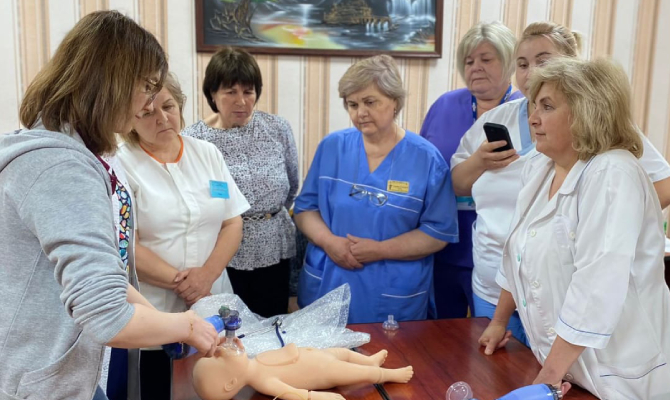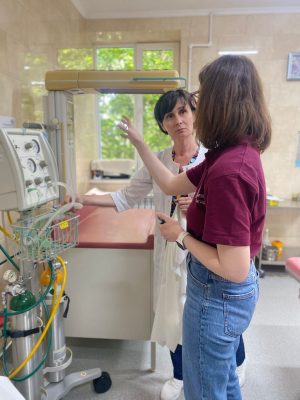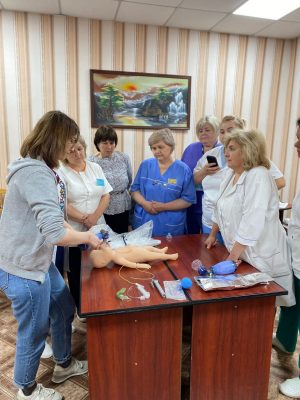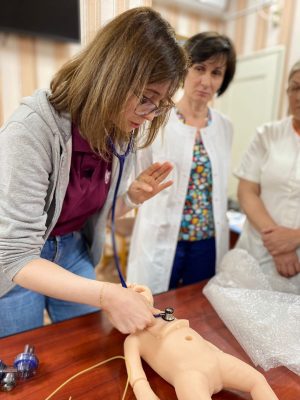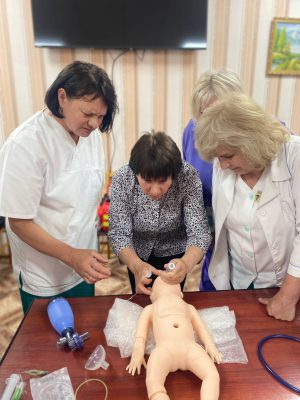2 two-day training courses were held in Soroca and Orhei Hospital, Moldova between Monday 20 and Friday 24 to foster capabilities on neonatal emergencies and stabilization among health workers deployed in secondary health facilities. The activity was conducted on-site with low-fidelity techniques by local professionals trained during “Training of Trainers –ToT” with the support of an international certified trainer in neonatal emergency and neonatal stabilization. Two interdisciplinary team, 11 people at Soroca and 16 at Orhei Hospital counting a total of 27 people composed of nurses, obstetricians and paediatricians got involved in the training in Soroca and Orhei Hospital respectively 94 and 31 miles away from the capital Chişinau. The training was designed to address a multidisciplinary team to simulate daily work activities and improve the responsiveness of local teams at peripheral facilities.
«Currently, the second phase of the project is underway. We are strengthening skills among health professionals working in the outskirts of Moldova by teaching them how to improve neonatal resuscitation – said Anastasia Tean, Trainers from the task force. I am happy to be part of this team. Now we are visiting the areas where we worked a year ago and we see firsthand the impact of our trainings. Doctors and nurses feel way more confident. The practical part develops in a much more interesting way, as all the medical staff act confidently in their practical knowledge. They follow the resuscitation algorithm precisely without ignoring details. As a practicing doctor in a level 3 hospital in Chisinau, I can observe the conditions in which children are transferred from the outskirts. And I can say with certainty that the stabilization of these children has greatly improved, which significantly increases the chances of successful treatment and survival of the children».
The activity paves the way to the second phase of R.I.S.E. project, led by Doctors with Africa CUAMM Uk and funded by The Italian Agency for Cooperation and Development (AICS) aiming at ensuring health service coverage at multiple level of the health system. Moldovan hospitals have reported an out-of-scale postnatal transport index (3.6% in 2022). Due to the long distance from the secondary facilities to the main hospital, it is essential that staff at peripheral levels are capable of performing stabilisation before the referral. In order to achieve the goal and offer quality care to mothers and children, an overall number of 84 health workers from 7 second-level hospitals located in 7 different regions will be engaged in the trainings.
Maternal mortality rate has significantly decreased in Moldova over the past 10 years, dropping from 44 per 100,000 live births in 2010 to 19 in 2017, the infant mortality rate per 1,000 live births has declined from 26 in 2010 to 12 in 2019 thanks to the proactive commitment of the Ministry of health and health workers. However, this rate still remains above the WHO index for European regions. Although maternal and infant mortality rates have reduced over the years, there is a margin to improve the mortality index and the output of emergency procedures by working on the remaining gaps regarding referral and post-natal healthcare in peripheral hospitals.
«These courses are much needed for strengthening our skills therefore deliver a better service to the population. Medecine is constantly evolving, being up to date is key especially in neonatal management but we have limited learning opportunities. Through these courses we acquire knowledge and confidence essential to promptely operate in case of emergency» said Silvia Ciugava – neonatologist from Soroca Hospital.
In Moldova, there are 32 hospitals handling a total of 27,000 births annually. However, many of these facilities have a low number of deliveries per year, below 500, resulting in limited exposure to maternal and newborn emergencies from health workers. Additionally, hospital data reports a high rate of post-birth transfers from peripheral facilities, that are not equipped with intensive care units, to third-level facilities located in the capital. Quality and timely newborns care after the delivery is hence highly needed in order to stabilize the newborn. For this reason, training activities on neonatal stabilization are key in peripheral facilities in order to avoid leaving these services uncovered.
Since the conflict broke out on 24th February, 2022, approximately over one million refugees crossed the border seeking refuge in Moldova, one of Europe’s most fragile countries. To prevent the collapse of the national healthcare system and address the healthcare needs of both the refugee and local populations, targeted interventions have been deemed necessary. CUAMM’s commitment in the country started in April 2022 in the capital Chişinau. Since then and in close collaboration with the Ministry of Health and the WHO, the intervention has been guided by the twofold objective of providing basic medical assistance within RACs and offering specific training for local medical personnel on neonatal emergency. To date, CUAMM is still committed to the such activities thanks to the support offered by the Italian Agency for Development Cooperation (AICS). The commitment also extends to Ukraine, focusing on the delivery of medicines, medical equipment, and consumables to healthcare facilities; distribution of food items, essential goods, and equipment to combat the cold; as well as providing psychological support to the most vulnerable.

